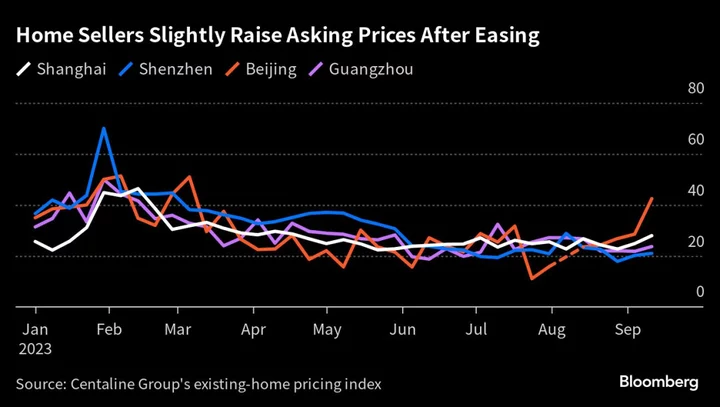A spurt of home sales in China’s biggest cities is losing momentum less than two weeks after authorities loosened mortgage restrictions, raising doubts over whether the steps are enough to revive the market before a crucial busy season.
While a dearth of official statistics makes it difficult to gain a comprehensive view, checks by industry watchers suggest that the rebound is fading in tier-1 cities.
Even in Beijing, which reacted the most to the stimulus, sales of existing homes plunged 35% to about 1,700 units last weekend from 2,600 in the weekend immediately after the easing, according to estimates by Centaline Group analyst Zhang Dawei based on his channel checks. New homes sold by developers in the capital city showed a similar trend. Centaline is one of China’s top property agencies.
In Shenzhen, new-home sales edged up 3.8% last week from a week earlier, while they continued to slide in Shanghai and Guangzhou, according to China Index Holdings. Across China, transactions continued to drop, falling more than 20% by area, the agency said.
The sputtering recovery underscores China’s struggle to arrest a record housing-market slump that’s stifling economic growth and worsening a debt crisis among developers. After the central government greenlit plans to cut the floor of the downpayment ratio on Aug. 31, the country’s four biggest cities all quickly rolled out easing measures.
The moves by local authorities came before September and October, which straddles a week-long holiday that often attracts homebuyers. The two months contributed to 18% of full-year sales since 2009, according to Centaline.
“The mortgage relaxation is showing a positive effect in the sense that the housing market is rebounding slightly,” said Liu Yuan, vice president for property research at Centaline. “But the current supportive measures aren’t enough to push the market to bottom out.”
To be sure, the easing may take time to show its effect as sentiment gradually warms up, Liu said. Even after the initial sales spike tapered off, homebuyer visits were still about 20% to 30% higher than periods before the supportive measures, he added.
Investors have welcomed the policy steps, with some speculating that more may be on the horizon. A Bloomberg gauge of Chinese developer shares has gained about 14% since policymakers announced the moves.
So far in September, about 10 cities have loosened restrictions on who can purchase homes, more than any single month this year, according to China Index Holdings. Some provincial capitals, such as Nanjing in Jiangsu and Fujian’s Fuzhou, have removed curbs for non-residents.
In another encouraging sign, some homeowners in the biggest cities have raised asking prices, suggesting residents expect demand to pick up, Centaline data showed.
Yet how long sentiment can stay positive remains a question, especially as supply also rises. Listings of existing residences climbed 2.7% in Beijing, 2.3% in Shenzhen and 0.6% in Guangzhou last week, accelerating from the week before the easing, data monitored by China International Capital Corp. showed.
“These measures mark a significant step towards stimulating the property sector and the broader economy, but we think they are still not enough,” said Lu Ting, chief China economist at Nomura Holdings Inc. “Beijing may have to introduce more aggressive easing measures to ensure a real recovery.”

